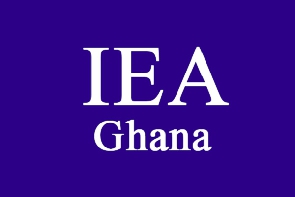 The Institute of Economic Affairs (IEA)
The Institute of Economic Affairs (IEA)
The Institute of Economic Affairs (IEA) welcomes the Bank of Ghana's endorsement of its proposal to cap Government borrowing to help rein in the public debt. As part of his press briefing on Thursday, October 6, 2022, on the decision of the Monetary Policy Committee, the Governor is reported to have said that he "supports discussions on capping borrowing" [Business & Financial Times (B&FT), Monday, October 10, 2022}. This is in view of deep concerns about the country's public debt after the World Bank released a report stating that Ghana's debt-to-GDP ratio could hit 104.6% by the end of the year. As the B&FT correctly reported, the lEA first made the call for the imposition by Parliament of a cap on borrowing (or debt) in the Institute's Comments on the 2022 Budget in November 2021. The cap, the IEA suggested, could be incorporated into the Parliamentary Appropriations Act, which approves Government's annual total spending, or introduced as a rule in the Fiscal Responsibility Act in addition to the deficit rule. In making this proposal, the IEA expressed concern that the borrowing implied by budget deficits seems to be invariably breached with impunity. Thus, it was necessary to tie the hands of the Finance Minister and insist that, any additional borrowing by him beyond the budget estimates or the new ceiling should be subject to the approval of Parliament just as pertains in the United States. This is the only way to rein in our debt and keep it at a sustainable level on a durable basis so as to avoid debt service, which currently absorbs over 40% of tax revenue, from overwhelming the budget. Since first making the suggestion in November 2021, the lEA has repeated the call in various subsequent communications. The Institute wishes it to be further known that, as part of the CSO Economic Governance Platform, it has made this suggestion available for consideration by the IMF Team currently negotiating a possible financial programme with the Ghanaian authorities. In that submission, the lEA also called for strict enforcement of both the ceiling of 5% of GDP on the fiscal deficit as well the ceiling of 5% of the previous year's revenue on Bank of Ghana's lending to the Government, both of which have debt implications.
The Institute of Economic Affairs (IEA) welcomes the Bank of Ghana's endorsement of its proposal to cap Government borrowing to help rein in the public debt. As part of his press briefing on Thursday, October 6, 2022, on the decision of the Monetary Policy Committee, the Governor is reported to have said that he "supports discussions on capping borrowing" [Business & Financial Times (B&FT), Monday, October 10, 2022}. This is in view of deep concerns about the country's public debt after the World Bank released a report stating that Ghana's debt-to-GDP ratio could hit 104.6% by the end of the year. As the B&FT correctly reported, the lEA first made the call for the imposition by Parliament of a cap on borrowing (or debt) in the Institute's Comments on the 2022 Budget in November 2021. The cap, the IEA suggested, could be incorporated into the Parliamentary Appropriations Act, which approves Government's annual total spending, or introduced as a rule in the Fiscal Responsibility Act in addition to the deficit rule. In making this proposal, the IEA expressed concern that the borrowing implied by budget deficits seems to be invariably breached with impunity. Thus, it was necessary to tie the hands of the Finance Minister and insist that, any additional borrowing by him beyond the budget estimates or the new ceiling should be subject to the approval of Parliament just as pertains in the United States. This is the only way to rein in our debt and keep it at a sustainable level on a durable basis so as to avoid debt service, which currently absorbs over 40% of tax revenue, from overwhelming the budget. Since first making the suggestion in November 2021, the lEA has repeated the call in various subsequent communications. The Institute wishes it to be further known that, as part of the CSO Economic Governance Platform, it has made this suggestion available for consideration by the IMF Team currently negotiating a possible financial programme with the Ghanaian authorities. In that submission, the lEA also called for strict enforcement of both the ceiling of 5% of GDP on the fiscal deficit as well the ceiling of 5% of the previous year's revenue on Bank of Ghana's lending to the Government, both of which have debt implications.